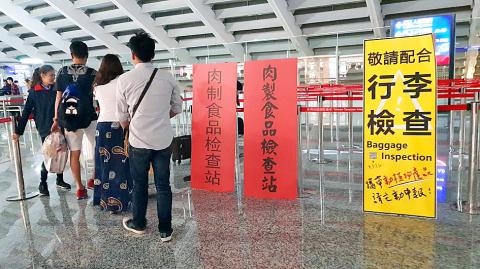With South Korea confirming an outbreak of African swine fever, the Council of Agriculture (COA) yesterday said that travelers caught bringing in pork products from that country would be fined a minimum of NT$200,000 (US$6,444).
Taiwan has been striving to keep the deadly swine disease at bay since China reported the first outbreak in August last year and the disease has continued to sweep across Asia.
The fine was put in place at 1pm yesterday after South Korean Minister of Agriculture Kim Hyun-soo said that the nation’s first case of the highly contagious disease was confirmed yesterday in tests on five pigs that died on Monday evening at a farm in Paju, a town near the border with North Korea.

Photo: Chien Hui-ju, Taipei Times
After North Korea reported an outbreak in late May, South Korea was included in the council’s list of countries with a higher risk of transmitting the disease, it said.
The carry-on luggage of tourists returning from high-risk countries have to undergo X-ray scans at customs, it said.
In addition to countries that have reported an outbreak of African swine fever — China (including Hong Kong and Macau), Mongolia, Vietnam, Cambodia, North Korea, Laos, Myanmar, the Philippines, South Korea and Russia — the council added Malaysia, Singapore, Indonesia and Brunei to its high-risk list earlier this month, even though they have not reported any infection cases.
Those caught attempting to bring pork products from countries that have reported an epidemic are to be fined NT$200,000 for a first-time offense and NT$1 million for repeat offenses, the council said.
Foreign tourists who fail to pay the fine for illegal pork imports at customs would be denied entry into Taiwan, it added.
As of Sunday, the government had issued 534 tickets of NT$200,000 each for travelers found carrying banned pork products, including 298 to Chinese tourists and 170 to Taiwanese travelers.
Of the 534 tickets, 491 were for attempting to bring in pork products from China, 42 from Vietnam and one from the Philippines.
The South Korean agriculture ministry later yesterday said it was also looking into a suspected second case from a farm in the nearby town of Yeoncheon, where the owner reported the death of a pig, and that test results were expected today.
Officials were yesterday planning to complete the culling of about 4,000 pigs raised at the Paju farm and two other farms run by the same family.
Seoul also strengthened efforts to disinfect farms and transport vehicles, and ordered a 48-hour standstill on all pig farms, slaughterhouses and feed factories across the nation to prevent the spread of the disease, which threatens a massive industry that involves 6,000 farms raising more than 11 million pigs.
Additional reporting by AP

A magnitude 7.0 earthquake struck off Yilan at 11:05pm yesterday, the Central Weather Administration (CWA) said. The epicenter was located at sea, about 32.3km east of Yilan County Hall, at a depth of 72.8km, CWA data showed There were no immediate reports of damage. The intensity of the quake, which gauges the actual effect of a seismic event, measured 4 in Yilan County area on Taiwan’s seven-tier intensity scale, the data showed. It measured 4 in other parts of eastern, northern and central Taiwan as well as Tainan, and 3 in Kaohsiung and Pingtung County, and 2 in Lienchiang and Penghu counties and 1

FOREIGN INTERFERENCE: Beijing would likely intensify public opinion warfare in next year’s local elections to prevent Lai from getting re-elected, the ‘Yomiuri Shimbun’ said Internal documents from a Chinese artificial intelligence (AI) company indicated that China has been using the technology to intervene in foreign elections, including propaganda targeting Taiwan’s local elections next year and presidential elections in 2028, a Japanese newspaper reported yesterday. The Institute of National Security of Vanderbilt University obtained nearly 400 pages of documents from GoLaxy, a company with ties to the Chinese government, and found evidence that it had apparently deployed sophisticated, AI-driven propaganda campaigns in Hong Kong and Taiwan to shape public opinion, the Yomiuri Shimbun reported. GoLaxy provides insights, situation analysis and public opinion-shaping technology by conducting network surveillance

‘POLITICAL GAME’: DPP lawmakers said the motion would not meet the legislative threshold needed, and accused the KMT and the TPP of trivializing the Constitution The Legislative Yuan yesterday approved a motion to initiate impeachment proceedings against President William Lai (賴清德), saying he had undermined Taiwan’s constitutional order and democracy. The motion was approved 61-50 by lawmakers from the main opposition Chinese Nationalist Party (KMT) and the smaller Taiwan People’s Party (TPP), who together hold a legislative majority. Under the motion, a roll call vote for impeachment would be held on May 19 next year, after various hearings are held and Lai is given the chance to defend himself. The move came after Lai on Monday last week did not promulgate an amendment passed by the legislature that

AFTERMATH: The Taipei City Government said it received 39 minor incident reports including gas leaks, water leaks and outages, and a damaged traffic signal A magnitude 7.0 earthquake struck off Taiwan’s northeastern coast late on Saturday, producing only two major aftershocks as of yesterday noon, the Central Weather Administration (CWA) said. The limited aftershocks contrast with last year’s major earthquake in Hualien County, as Saturday’s earthquake occurred at a greater depth in a subduction zone. Saturday’s earthquake struck at 11:05pm, with its hypocenter about 32.3km east of Yilan County Hall, at a depth of 72.8km. Shaking was felt in 17 administrative regions north of Tainan and in eastern Taiwan, reaching intensity level 4 on Taiwan’s seven-tier seismic scale, the CWA said. In Hualien, the